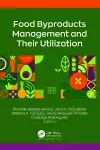
Food Byproducts Management and Their Utilization
5 contributors - Hardback
£147.00
Ricardo Gómez-García is a PhD student at the Centre of Biotechnology and Fine Chemistry (CBQF) in the School of Biotechnology at Catholic University of Portugal, Porto, Portugal. He graduated as a chemical engineer from the School of Chemistry at Autonomous University of Coahuila (UA de C), Mexico. He started his scientific career at the Food Research Department at the U A de C, where he developed his expertise in food engineering and technology, food chemistry, and biotechnology. Currently, his PhD work involves developing innovative and sustainable technologies within the context of zero-waste and circular economy approach for the extraction and identification of functional bioactive compounds with industrial interest from fruit by-products for their valorization and reincorporation into the industrial value chains. Mr. Gómez-García is the author and co-author of 16 articles in indexed journals, and several chapters in books of international circulation. He holds one European provisional patent and a national patent application. He has participated in more than 15 international congresses in areas related with biotechnology, food science and technology, and bioengineering. In addition, he has been participating in several national and international entrepreneurship programs in Portugal and across Europe through the European Institute of Innovation & Technology (EIT Food).
Ana A. Vilas-Boas is a PhD student at the Centre of Biotechnology and Fine Chemistry (CBQF) in the School of Biotechnology at Catholic University of Portugal, Porto, Portugal. Ms. Vilas-Boas holds a BSc in Biotechnology, an MSc in Food Engineering and is currently a PhD student in Biotechnology at the Catholic University of Portugal. She has expertise as a researcher within the framework of diverse national and European projects, such as ESSENCE (2017), FODIAC (2018), Nature Bioactive Food (2020), and MEDISMART (present) project at the Centre for Biotechnology and Fine Chemistry (CBQF) of Catholic University of Portugal. She has been working directly with some Portuguese industries in the context of food by-products and non-compliant food management from food industrial chains to characterize and identify value-added bioactive compounds. Currently, her PhD work involves the development of innovative, integrative, and sustainable processes to valorize orange by-products within the circular economy context for the extraction of hesperidin and pectin to develop a novel nutraceutical to enhance gut microbiota health. She has published 12 articles in indexed journals, several chapters in books, and several international congress communications. In addition, she has participated in entrepreneur programs and was awarded first place in Ecotrophelia Portugal (2018), Innovation Track (2018), and Born from Knowledge-Ideas (2019).
Débora A. Campos, PhD, is a postdoctoral researcher at the School of Biotechnology at Catholic University of Portugal, Porto, Portugal. Dr. Campos’s scientific work is on waste/by-products valorization from agro-industrial origin, where she is developing innovative and sustainable green technologies for the extraction/separation of compounds of industrial interest. This work allowed her submission and acceptance of a European patent for a new industrial technology application. She has carried out scientific research work in different areas, green nanotechnology, and microbiology. She has been working on several European projects and programs within the framework of entrepreneurism approach, such as LAB2BUSINESS (Porto, 2017), Global Food Venture-EIT Food (2018), and EIT Food Innovator Fellowship (2019). Dr. Campos holds a BSc in Bioscience, a MSc in Applied Microbiology, and a PhD in Biotechnology, all awarded by the Catholic University of Portugal, where she is currently doing postdoctoral work within the MIRACLE-H2020 Eu project (ending in 2022). Finally, Dr. Campos has published 34 scientific articles in international journals and several book chapters. She is a co-advisor of PhD theses. She holds one granted European patent and a national patent. She has participated in scientific European projects and has attended over 25 international congresses in the area of foods and functional ingredients.
Maria Manuela Pintado, PhD, is Director of the Centre of Biotechnology and Fine Chemistry (CBQF) in the School of Biotechnology at the Catholic University of Portugal. As Associate Professor, she works on the interface of microbiology with health. Professor Pintado has developed numerous projects of I & D+I (with companies and scientific institutions, both national and international) in the areas of valuing of by-products and residues, production and characterization of bioactive compounds, functional foods, and natural antimicrobials. Additionally, she has been advisor of 18 PhD theses, 16 postdoctoral fellowships, 36 MSc theses, and 54 BSc theses. She is Pharmaceutic by the University of Portugal; she has an MSc in Food Science and Engineering, and her PhD is in Biotechnology, both earned at the Centre of Biotechnology and Fine Chemistry at her university. Dr. Pintado has published more than 320 papers in indexed journals, 35 book chapters, 34 proceedings, and more than 150 contributions in scientific meetings, and holds 20 patents.
Cristóbal Noé Aguilar, PhD, is a Director of Research and Postgraduate Programs at the Universidad Autonoma de Coahuila, Mexico. Dr. Aguilar has published more than 360 papers in indexed journals, and 450 contributions in scientific meetings. He has also edited more than 30 books. He has been awarded several prizes and awards, the most important of which are the National Prize of Research (2010) from the Mexican Academy of Sciences; the Prize CCC-2008 from the Mexican Society of Biotechnology and Bioengineering; National Prize AgroBio-2005; and the Mexican Prize in Food Science and Technology. In 2019 he received the Outstanding Research Award by the International Association of Bioprocessing (IBA). Dr. Aguilar is a member of the Mexican Academy of Science, the Central Council of the International Bioprocessing Association, the Mexican Academy of Sciences, the Mexican Society for Biotechnology and Bioengineering, and the Mexican Association for Food Science and Biotechnology. He has developed more than 41 research projects, including 25 international exchange projects.